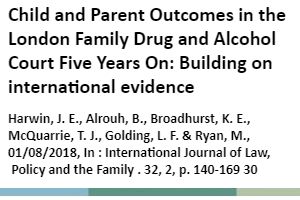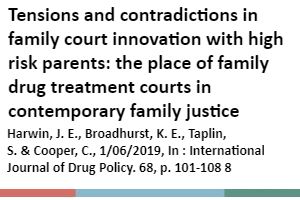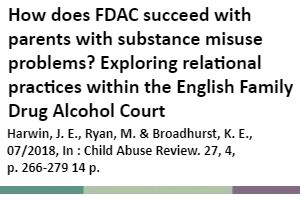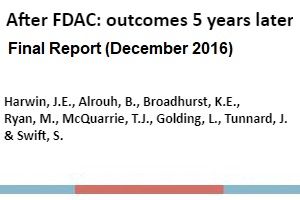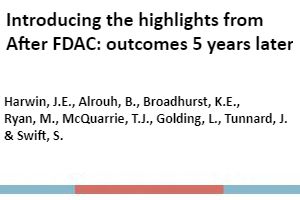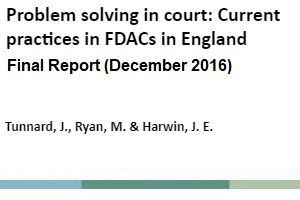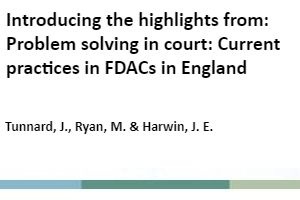Family Drug and Alcohol Court (FDAC) Evaluation Research
What is FDAC?
The Family Drug and Alcohol Court (FDAC) in care proceedings is a problem-solving court. Adapted from an American model it aims to improve outcomes for children and families by providing an alternative way of working with parents whose children are subject to proceedings because of parental substance misuse.
The rise of family drug and alcohol courts has been one of the most radical developments in English family justice in recent years. FDACs aim to treat as well as to adjudicate. Their goal is to achieve safe and sustainable family reunification and, if that is not possible, to promote swift, permanent out-of-home care. Judges play a non-traditional role and meet with parents regularly in non-lawyer review hearings, to help enhance their motivation to change. Parents receive an intensive package of support led by the FDAC multidisciplinary team which also advises the court. None of these features are present in ordinary care proceedings.
The FDAC Pilot
The FDAC pilot ran from January 2008 to March 2012 at the Inner London Family Proceedings Court in London, with the specialist team provided by a partnership between the Tavistock and Portman NHS Foundation Trust and the children’s charity, Coram. The pilot began with three participating London Boroughs – Camden, Islington and Westminster. Hammersmith and Fulham and Southwark joined the pilot in 2012.
Professor Judith Harwin (formerly at Brunel University) was funded by the Nuffield Foundation and the Home Office to evaluate the FDAC pilot working in partnership with RyanTunnardBrown.
The pilot evaluation indicated that the FDAC model was promising, showing that a higher proportion of parents whose case was heard in FDAC had ceased misusing substances by the end of proceedings and more FDAC than comparison families were reunited with their children. Additionally, proportionately fewer children in FDAC families experienced further neglect or abuse in the first year following reunification.
The FDAC National Unit
Following these promising findings, the President of the Family Division expressed the ambition to see FDAC embedded in all designated family justice areas across the country. The FDAC National Unit was established in 2015 by a partnership led by the Tavistock and Portman NHS Trust, through funding from DfE’s Innovation Programme (£3.28M), to support a number of new FDAC sites. The aim was to help parents involved in court based proceedings to overcome the substance misuse that had put their children at risk of serious harm. NatCen Social Research was commissioned to evaluate the FDAC National Unit and their report is available here. Additionally, the Centre for Justice Innovation undertook a financial analysis of the London FDAC.
Longer-term Outcomes
The Department for Education Innovation Children’s Social Care Programme funded Professor Harwin to carry out an evaluation of the longer-term outcomes of FDAC. It was conducted by Brunel University London, Lancaster University and RyanTunnardBrown and transferred to Lancaster University in April 2016. This study provided a longer-term follow-up of cases coming into the first FDAC pilot service between 2008 and 2012 and similar cases entering ordinary care proceedings in the same court over the same period. It provided new evidence of the sustained benefits of FDAC [highlights report and full report].
Problem-Solving in Court: How do courts implement FDAC?
The Department for Education Innovation Children’s Social Care Programme funding included an evaluation of the approach used by judges hearing care proceedings in Family Drug and Alcohol Courts in England. It gives a picture of how new and longer-standing FDAC sites are implementing the FDAC problem-solving approach. The study consisted of observations of 46 hearings in 10 FDAC courts and interviews with 12 FDAC judges. The results were encouraging [highlights report and full report].
Government supports a major expansion and evaluation of Family Drug and Alcohol Courts (2019 - 2023)
In 2019 the government announced a major new £15M programme Supporting Families: Investing in Practice. FDAC is one of just 3 initiatives to receive support. This is because it showed promising outcomes under the previous Department for Education Children’s Social Care Innovation Programme.
The Supporting Families: Investing in Practice programme is run jointly with the Department for Education, with the What Works Centre for Children’s Social Care overseeing the evaluations. Evaluation is a condition of funding.
Fourteen FDAC projects are receiving support under the Supporting Families: Investing in Practice programme. By 2021, 14 FDAC teams will service 35 local authorities and 20 family courts.
The Centre for Justice Innovation are the delivery partners to the Supporting Families: Investing in Practice programme, providing training and support to the new sites as well as to those which already operate.
Evaluation under the Supporting Families: Investing in Practice Programme
NatCen Social Research has been funded to carry out an evaluation of the effectiveness of FDAC. Professor Harwin has been appointed as a consultant to the project, advising on the design and outcome measures and final report.
The NatCen evaluation will compare reunification and parental substance misuse outcomes across all 14 sites with outcomes for families that did not access FDAC. It will also undertake an integrated implementation and process evaluation to understand how FDAC is implemented and perceived impacts of the intervention.
Other evaluations of FDAC that are being undertaken under the Supporting Families: Investing in Practice programme address:
- Peer-mentoring; evaluated by the University of Sussex.
- Post-proceedings support in the Gloucestershire FDAC; evaluated by Kings College London.
- Engagement with FDAC using behavioural insights; evaluated by the Centre for Evidence Implementation
The Family Drug and Alcohol Courts National Advisory Board
The Centre for Justice Innovation coordinates the Family Drug and Alcohol Courts National Advisory Board. Chaired by Baroness Hallett DBE PC, it will provide advice to the President of the Family Division and ad hoc advice to the National Family Justice Board. Professor Harwin is a member of the Board and represents the academic community.


